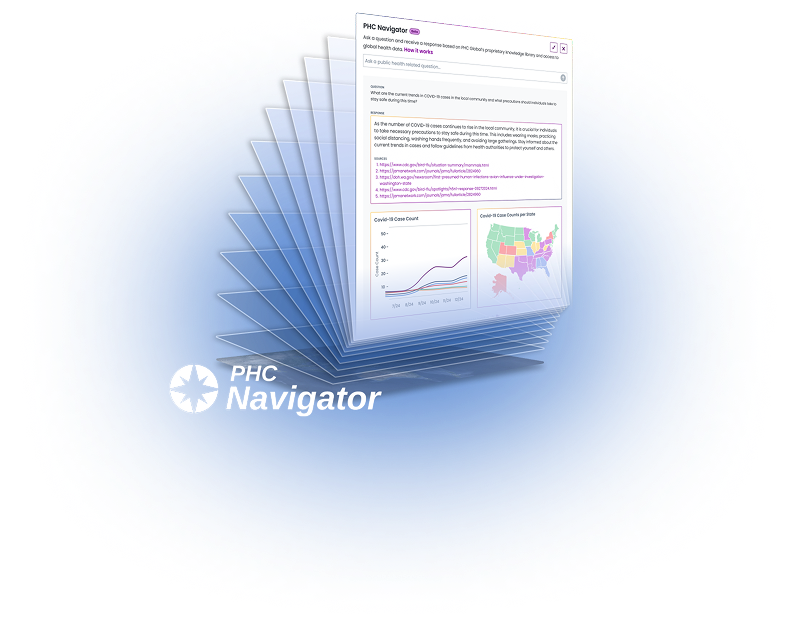Building the Future of Biodefense
Biothreat intelligence to deter and detect natural, accidental, deliberate and novel biological agents.
Biothreat intelligence to deter and detect natural, accidental, deliberate and novel biological agents.
Recommendation: Organizations in Adams and Broomfield Counties, Colorado, should inform employees about the potential measles exposures. Organizations should provide flexible work schedules to support employees who need to make vaccine appointments for themselves or their family members. Measles is highly contagious and can quickly spread among unvaccinated individuals in a work environment.
Situation: Colorado reported a measles case in an Adams County resident, and it is 2nd case of measles at Broomfield High School (see PHC alert 3/2). Neither of the infected students had received the measles, mumps, and rubella (MMR) vaccine. The individual may have exposed the public at Broomfield High School (2/24-27), Chick-fil-A in Broomfield (2/25), and Chipotle in Westminster (2/26). Exposed individuals should monitor for measles symptoms (7-21 days from exposure). [Confidence: Very High]
Recommendation: Organizations in Micronesia, Kiribati, and the Marshall Islands should ensure employees have access to potable water and encourage them to seek treatment if they develop symptoms. Employees with young children may require absenteeism for caregiving support. Organizations should provide flexible work schedules to allow sick employees (or those with caregiving duties) to stay home until 48 hours after symptoms have stopped and to support employees making rotavirus vaccine appointments for family members.
Situation: Several gastrointestinal outbreaks were reported across the Pacific Islands recently. Micronesia confirmed a norovirus outbreak in Pohnpei State, totaling 12 cases from late Jan to late Feb. 92% of cases were hospitalized, and 2 pediatric deaths were recorded. A large jump in suspected rotavirus cases was reported in Kiribati, totaling 1,397 diarrheal cases, including 147 confirmed and 37 probable rotavirus cases. The outbreak was first declared in late Feb with 16 confirmed cases (see PHC alert on 2/24). Transmission is widespread across South Tarawa, North Tarawa, and Betio, though no cases have been detected on the outer islands. The Marshall Islands also detected rotavirus in 8 individuals in Majuro. The detections prompted clinical alerts and heightened surveillance. [Confidence: Very High]
Recommendation: Informational update only.
Situation: The WHO issued recommendations for the viral composition of influenza vaccines for the 2026-2027 northern hemisphere influenza season. The recommended strains for egg-based vaccines include an A/Missouri/11/2025 (H1N1)pdm09-like virus, an A/Darwin/1454/2025 (H3N2)-like virus, and a B/Tokyo/EIS13-175/2025 (B/Victoria lineage)-like virus. The recommended strains for cell culture-, recombinant protein- or nucleic acid-based vaccines include an A/Missouri/11/2025 (H1N1)pdm09-like virus, an A/Darwin/1415/2025 (H3N2)-like virus, and a B/Pennsylvania/14/2025 (B/Victoria lineage)-like virus. The announcement was made following a 4-day consultation examining global influenza surveillance data. Overall, influenza A viruses were predominant during the 2025-26 northern hemisphere respiratory season, with the A(H3N2) variant J.2.4.1 (“subclade K”) dominating following its emergence in August 2025 before spreading globally. Other variants of A(H3N2) and A(H1N1) were also recorded. Low levels of influenza B viruses (B/Victoria lineage) were detected, with no cases of B/Yamagata lineage viruses recorded since March 2020. [Confidence: Very High]
Recommendation: Spain has reported 4 human cases of swine influenza A(H1N1)v in the past 17 years, including a case in Catalonia reported in 2024. Limited, non-sustained human-to-human transmission of variant influenza viruses has previously been documented. Organizations can lower barriers to seasonal flu vaccines for their employees. Employees should avoid contact with diseased swine.
Situation: Spain confirmed a human case of influenza virus A(H1N1) variant of swine origin in Catalonia. The asymptomatic individual reported no history of exposure to pigs or a contaminated environment. Media sources reported that this infection may have resulted from human-to-human transmission, though other hypotheses are under investigation. Testing results from the case's direct contacts were all negative, suggesting that forward transmission has not occurred. Spain, European, and WHO officials stated that the risk level for the general public and for further transmission was Very Low. An investigation is ongoing. [Confidence: Very High]
Recommendation: Organizations in Suriname should reduce mosquito populations at their facilities by eliminating standing water. Employees can prevent mosquito bites by wearing protective clothing, using insect repellent, and eliminating standing water near their homes. Organizations should inform employees with planned work travel to affected countries and support pregnant employees who opt not to travel. Employees should consult a doctor about vaccination against chikungunya before traveling to affected areas. Vaccine eligibility and availability may vary by country.
Situation: Suriname health officials reported 1,150 chikungunya infections so far this year, with the virus spreading quickly and further across the country. By comparison, a 2014 outbreak saw 700 cases over 4 months, making the current outbreak far more rapid. Media sources reported that healthcare officials believe the actual number is likely much higher. Large-scale mosquito control efforts have not started yet due to insufficient pesticides and larvicides, though new shipments from Barbados and Brazil are expected. However, larvicides are still being used in some areas to fight mosquito larvae. Despite rising cases, hospitals remain able to manage patient care. Officials urged the public to help control the spread of the virus by removing stagnant water, wearing protective clothing, using repellents, and sleeping under mosquito nets. Earlier in the month, the US CDC issued a Level 2: Practice Enhanced Precautions travel advisory due to the chikungunya outbreak in Suriname (see PHC alert 2/6). See PHC alerts 2/11, 2/6, 1/30, and 1/22 for earlier info. [Confidence: Very High]
Leverage operational biosurveillance to anticipate and assess biological risks, drive decision-making, and protect mission-critical operations.


PHC Navigator is a biothreat intelligence engine built on expert-curated and proprietary data and models that provides actionable intelligence and insights


© 2025 PHC Global. All rights reserved.
We are excited to show you the PHC Pharos Platform in action!
Enter your contact information and we'll reach out to schedule a demo.